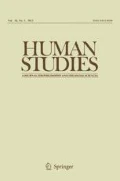Abstract
My paper picks up a long ignored suggestion of Sheldon Wolin - that we use Thomas Kuhn's analysis of scientific revolutions to examine the crisis of "normal" political science. This approach allows us to see the connection between the state of the discipline and the larger crisis of meaning afflicting modernity. I then use Eric Voegelin's notion of a multicivilizational "truth quest" - or search for meaning - to make a case for institutionalizing "extraordinary" or "revolutionary" political science. I attempt such a discipline by following Voegelin - reflecting on "the full amplitude of human experience." Such a meditation takes place within the "first reality of existence" - Plato's metaxy or the "in-between" - the experience of human existence between the sacred and the mundane. I bring to Voegelin's exploration of the metaxy the realm of experience which is most radically "other" for modernity - the primal political order of paleolithic and contemporary hunting gathering societies. I argue that shamanic "Urreligion" and Socratic discussion share a boundary crossing logic which provides a basis for a discipline of "extraordinary political science." Finally I suggest that such a discipline is both the quest for, and, in a sense, a realization of, the ‘Good Life’ - a source of order for the individual and society.
Similar content being viewed by others
References
Almond, G. (1990). The Nature of Contemporary Political Science: A Roundtable Discussion. PS: Political Science and Politics (Fall): p. 35.
Almond, G. (1988). Separate Tables: Schools and Sects in Political Science. PS: Political Science and Politics (Fall).
Barnard, A. and Woodburn, J. (1988) Hunter and Gatherers 2: Property, Power, and Ideology. New York: Berg.
Berman, M. (1984). The Reenchantment of the World. New York: Bantam.
Berry, T. (1988). The Dream of the Earth. San Francisco: Sierra Club.
Burtt, E.A. (1954). The Metaphysical Foundations of Modern Science. NY: Doubleday Anchor.
Butterfield, H. (1957). The Origins of Modern Science 1300–1800. New York: The Free Press.
Cooper, B. (1982). A Lump Bred in Darkness: Two Tellurian Themes of the Republic. Paper presented at the Canadian Political Science Association Ottawa 1982. Copies available from Dr. Cooper, University of Calgary.
Dallmayr, F. (1993). Tradition, Modernity and Confucianism. Human Studies 16: 203-211.
de Chardin, T. (1975). The Phenomenon of Man. New York: Harper.
Deleuze, G. and Guattari, F. (1987). A Thousand Plateaus: Capitalism and Schizophrenia. Minneapolis: University of Minnesota Press.
Dodds, E.R. (1964). The Greeks and the Irrational. Berekely: Berekely Press.
Duerr, H.P. (1985). Dreamtime: Concerning the Boundary between Wilderness and Civilization. New York: Basil Blackwell.
Eliade, M. (1964). Shamanism: Archaic Techniques of Ecstasy. Princeton: Princeton University Press.
Foucault, M. (1984). What is Enlightenment? In P. Rabinow (Ed.), The Foucault Reader. New York: Pantheon.
Furst, P. (1976). Hallucinogens and Culture. San Francisco: Chandler and Sharp.
Hoffman, A. (1993). Ecology and Reason: Towards a Political Ecology of the Community of Being. Unpublished Ph.D. thesis. University of Hawaii: pp. 55-59.
Horkheimer, M. (1972). Critical Theory: The Social Function of Philosophy. New York: Seabury Press.
Jaffe, A. (1979). C.G. Jung, Word and Image. Princeton: Princeton University Press.
James, W. (1961). Varieties of Religious Experience. New York: Macmillan, Collier Books.
Jung, C.G. (1972). Mandala Symbolism. Princeton: Princeton/Bollingen.
Kuhn, T. (1962/1972). The Structure of Scientific Revolutions. Chicago: University of Chicago Press.
Lame Deer, J. and Erdoes, R. (1972). Lame Deer Seeker of Vision: Life of a Sioux Medicine Man. New York: Simon and Schuster.
Lee, R. and Leacocks, E. (1982). Politics, and History in Band Societies: pp. 1, 7–8. New York: Cambridge University Press.
Locke, J. (1690/1964). An Essay Concerning Human Understanding. New York: Meridian.
McKenna, T. (1992). Food of the Gods: The Search for the Original Tree of Knowledge. New York: Bantam.
Melody, M. (1980). Lakota Myth and Government: The Cosmos as the State. American Indian Culture and Research Journal 4(3): pp. 1-19.
Meyers, F. (1988). Critical Trends in the Study of Hunter-Gatherers. Annual Review of Anthropology 17: 261-283.
Neumann, E. (1969). Depth Psychology and a New Ethic. New York: Hodder and Stoughton.
Ohiyesa (Eastman, C.) (1971). The Soul of the Indian,quoted in T. McCluhan, Touch the Earth: A Self Portrait of Indian Existence. New York: Promontory Press.
Otto, R. (1962). Mysticism East and West. New York: Macmillan, Collier Books.
Plato (1966). Apology in Plato Portrait of Socrates: The Apology, Crito and Phaedo. Trans. R. Livingstone (Ed.), London: Oxford University Press.
Ruck, C. (1981). Mushrooms and Philosophers. Journal of Ethnopharmacology 4: pp. 179-205.
Rummel, R.J. (1994). Death by Government. New Brunswick: Transaction.
Sahlins, M. (1972). Stone Age Economics. Chicago: Aldine Atherton.
Sheldrake, R. (1991). The Rebirth of Nature: The Greening of Science and God. New York: Bantam.
Storm, H. (1972). Seven Arrows. New York: Harper and Row.
Swimme, B. (1984). The Universe is a Green Dragon: A Cosmic Creation Story. Santa Fe: Bear and Company.
Swimme, B. (1987). The Resurgence of Cosmic Storytellers. Revision 9. (2 Winter/Spring).
Swimme, B. and Berry, T. (1992). The Universe Story: A Celebration of the Unfolding of the Cosmos From the Primordial Flaring Forth to the Ecozoic Age. San Francisco: Harper.
Vlastos, G. (1991). Socrates, Ironist and Moral Philosopher. Syracuse: Cornell University Press.
Voegelin, E. (1952/1987). The New Science of Politics: An Introduction. Chicago: University of Chicago Press.
Voegelin, E. (1958). Order and History, Volume 1: Israel and Revelation. Baton Rouge: Louisiana State University Press.
Voegelin, E. (1987). Order and History, Volume 5: In Search of Order. Baton Rouge: Louisiana State University Press.
Voegelin, E. (1990). On Debate and Existence. Published Essays 1966–1985 Volume 12. Baton Rouge: Louisiana State University Press.
Wilson, E.O. (1992). The Diversity of Life. New York: Norton.
Wolin, S. (1968). Paradigms and Political Theories. From P. King and B.C. Parekh, Politics and Experience. Cambridge University Press.
World Watch Institute (1990). State of the World 1990. New York: World Watch Institute.
Author information
Authors and Affiliations
Rights and permissions
About this article
Cite this article
Herman, L. Beyond Postmodernism: Restoring the Primal Quest for Meaning to Political Inquiry. Human Studies 20, 75–94 (1997). https://doi.org/10.1023/A:1005382017058
Issue Date:
DOI: https://doi.org/10.1023/A:1005382017058




